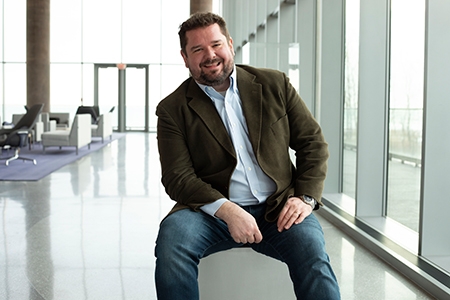Tom Burke '00
MAJOR: English
CURRENT POSITION: Assistant director, Alice Kaplan Institute for the Humanities, Northwestern University
Tom Burke’s mother is quick to point out that her son’s dark and funny new novel, Eastbound to the Cosmos, is not autobiographical.
“That’s not me!” she exclaimed at one of his public readings.
No wonder.
The novel opens as the protagonist, Everett, returns to Chicago from China to mourn his late father and finds his mother (not Burke’s mom!) swayed by “new age hooey.” She has a ponytailed spiritual guide, a roomful of healing crystals and a thing for naked yoga.
Everett eventually joins up with a cult-affiliated former roommate to smuggle exotic gourmet mushrooms.
For his part, the author denies any association with cults or mushroom smuggling.
While not autobiographical, the book is informed by the author’s experiences, starting at Union, “which really shaped the trajectory of my life and career,” said Burke who graduated in 2000 as an English major.
Eastbound “explores new kinds of faith and spirituality and the lengths people will go to fulfill those needs,” the author said.
Burke, who has been making the rounds at book clubs and readings, says that readers are finding a tension between levity and sadness. “Some people get the humor and are along for the ride, others have a darker take on it. I’m happy with both of those responses.”
Burke was on campus in February to give a reading and to talk with students. His advice: explore. “I hope students will get out of their comfort zones and be reflective about what they enjoy. To not be preoccupied with where their career will go (but not to not worry about a career) and let your mind explore and take you places you didn’t expect to go.”
The most meaningful part of Burke’s Union career came from the mentors who would guide him well after his time on campus.
As a student, he came under the tutelage of Mikhail “Misha” Lossel, a Russian émigré who was then Union’s writer-in-residence. Burke joined Lossel at the Summer Literary Seminars, the international month-long creative writing program that Lossel founded in his native St. Petersburg.
“I fell in love with the intellectual discourse with some of the finest North American writers, and also fell in love with the city,” Burke said.
For the next 10 summers, Burke returned to St. Petersburg with Lossel, who made Burke assistant director of the Russia program. The pair also began a similar program in Nairobi, Kenya, which Burke ran for five years.
Besides Lossel, he was also close to two other former Union faculty members, poet and writer Ed Pavlic and the late Binyavanga Wainaina, who succeeded Lossel as Union’s writer-in-residence. Burke later worked alongside Wainaina as co-director of Bard College’s Chinua Achebe Center for African writers and artists.
For Burke, who first traveled abroad on a Union term in France, the challenges of leaving home and returning offer fertile ground for fiction. In his new novel, a chapter begins with his observation that people skip town to avoid problems that “don’t magically disappear because of a temporary relocation.”
After Union, Burke earned an M.F.A. from the University of Massachusetts, Amherst. He has taught at UMass Amherst, the Newberry Library and Northwestern University, where he is assistant director of the Kaplan Humanities Institute. He lives in his native Evanston, Ill., with his wife and two children.
Among the honors in his author’s bio, he first lists the Eugene Yudis Prize for Fiction at Union.

